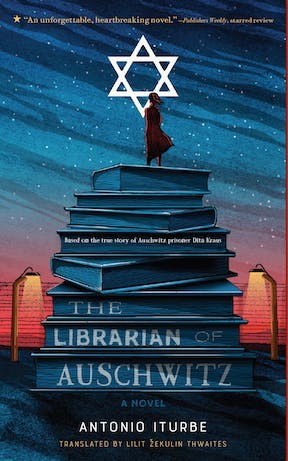Dita is fourteen when we first meet her in Auschwitz. She is there with her mother, her father in a different part of the camp. This camp is the Family Camp, where Dita goes to be with other children of all ages during the day, and where she becomes an important part of others lives. She is asked to look after something forbidden. Something that she could be shot on the spot for by the SS guards who run the camp – Books.
Dita goes to be with other children of all ages during the day, and where she becomes an important part of others lives. She is asked to look after something forbidden. Something that she could be shot on the spot for by the SS guards who run the camp – Books.
There are only a handful of them. Maths. A short history of the world. A Geography book and others. They have been smuggled into the camp and are hidden in the floorboards of the leader of their group. Dita is in charge of making sure the books stay hidden when not in use, and keep track of who has what book at any given time.
Another forbidden activity is a school for the children, right under the guard’s noses. The books aren’t the only source of information. They have ‘living’ books in their library too. These are people who may have been ex teachers before they were sent by railway in cattle cars to the death camp called Auschwitz. Or they may be experts in a particular topic. All are used in keeping the children’s minds off the ash in the air, the bodies that appear everywhere around them, and the horrific brutality of their guards.
The family camp is an anomaly in the Third Reich’s ‘Final Solution’ – inmates mostly fed three times a day, even if they sleep two or three to a bunk in lice infected blankets and only have thin soup or small hard pieces of bread to eat.
Other viewpoints are given throughout the novel as the omniscient narrator jumps from head to head. This is most revealing, showing the inner truths of people around Dita.
– Her idol, and leader, Freddy Hirsch. Kind, quiet, popular but mostly keeping to himself.
– Other prisoners with escape plans that happen or not, with equally terrible outcomes.
– Dita’s own mother whom Dita tries to hide things from. But her mother is wise beyond Dita’s own knowledge, watching her daughter having to spend years growing up under such brutal circumstances. It tears at her very being.
-Josef Mengele (The Angel of Death), who thought nothing of injecting children with poisons to see how they reacted, or not using an anaesthetic for his abhorrent operations on twins, pregnant women or children. Dita is petrified of Mengele after he speaks to her one day, telling her he is watching her.
Dita spends time back in her memories when she can, providing the reader with a picture of life before Auschwitz. The changes in her life were always explained by her mother as – “It’s the war,” from early events where they are banned from shops, then school, then their jobs. They are sent to the ghettos, then onto the cattle cars that take them to Auschwitz.
As Dita learns that the Family Camp isn’t what she believes, her life changes yet again. Can she keep her promise to a loved one? Can she keep going and never give up?
Based on the true story of Dita Polachova/Kraus from Prague, and people she met, The Librarian of Auschwitz is a harrowing tale. I have read many stories of the Holocaust but when I read this story the first time, I just couldn’t write a review. This story is so raw, real, brave and brutal. The writing and omniscient point of view made everything so much more present in my head.
The author mentions in the afterword that books cannot feed you, protect you from guns or prevent disease – but books provide knowledge and imagination, giving Dita and other children somewhere else to go and an escape from real life horror around them.
Author – Antonio Iturbe
Translated by Lilit Žekulin Thwaites
For readers 14+ (Not for younger readers)
10/10
(2012, Translated into English 2017, Holocaust, Bergen-Belsen, Jewish, Jews, Victims, SS Guards, German Soldiers, WWII, World War 2, The Final Solution, Gas Chambers, Mass Murder, Concentration camps, Experiments, Brutal, True Horror, Death, Trains, Historical, Growing up, Hope, Love, Friendship, Based on Truth, Survival, Courage, Bravery, Escape, Grief, Loss, Reading, Learning, Imagination, Books, School, Secret)
